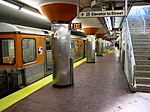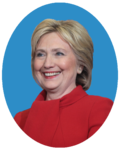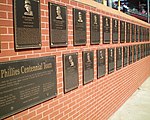Spectrum (arena)
1967 establishments in Pennsylvania2009 disestablishments in Pennsylvania2011 disestablishments in PennsylvaniaBasketball venues in PhiladelphiaBoxing venues in Philadelphia ... and 28 more
Buildings and structures completed in 1967Culture of PhiladelphiaDefunct National Hockey League venuesDefunct arena football venuesDefunct boxing venues in the United StatesDefunct college basketball venues in the United StatesDefunct indoor arenas in PennsylvaniaDefunct indoor ice hockey venues in the United StatesDefunct indoor lacrosse venues in the United StatesDefunct indoor soccer venues in the United StatesDefunct sports venues in PhiladelphiaDemolished sports venues in PennsylvaniaFormer National Basketball Association venuesFormer ice hockey venues in the United StatesIndoor ice hockey venues in PennsylvaniaLa Salle Explorers men's basketballLandmarks in PhiladelphiaNCAA Division I Men's Basketball Tournament Final Four venuesNorth American Soccer League (1968–1984) indoor venuesPhiladelphia 76ers venuesPhiladelphia BulldogsPhiladelphia Flyers arenasPhiladelphia PhantomsSouth PhiladelphiaSports venues completed in 1967Sports venues demolished in 2011Use mdy dates from January 2019Villanova Wildcats men's basketball

The Spectrum (later known as CoreStates Spectrum, First Union Spectrum and Wachovia Spectrum) was an indoor arena in Philadelphia, Pennsylvania, United States. Opened in September 1967 as part of what is now known as the South Philadelphia Sports Complex, after several expansions of its seating capacity it accommodated 18,168 for basketball and 17,380 for ice hockey, arena football, indoor soccer, and box lacrosse. The last event at the Spectrum was a Pearl Jam concert on October 31, 2009. The arena was demolished between November 2010 and May 2011.
Excerpt from the Wikipedia article Spectrum (arena) (License: CC BY-SA 3.0, Authors, Images).Spectrum (arena)
North Access Road, Philadelphia South Philadelphia
Geographical coordinates (GPS) Address Nearby Places Show on map
Geographical coordinates (GPS)
| Latitude | Longitude |
|---|---|
| N 39.904166666667 ° | E -75.171111111111 ° |
Address
Lot G
North Access Road
19148 Philadelphia, South Philadelphia
Pennsylvania, United States
Open on Google Maps










